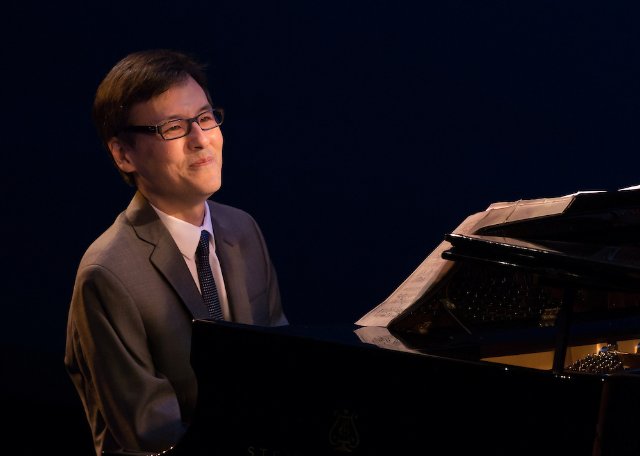Matthew Polenzani Sings at Park Avenue Armory
Ken Nodo Accompnies in intimate Officer's Room
By: Susan Hall - May 28, 2024
To hear great singers in the Officer's Room of the Park Avenue Armory is a special privilege. One of the largest rooms in the Armory, today it feels like a salon room in an elegant apartment. A lost world is very present for the audience up close and personal. The cherished tenor, Matthew Polenzani, a regular star at the Metropolitan Opera, gives us his special textures and dynamics.
In the first half of his program, Polenzani may have thought for a few moments he was on the Metropolitan Opera stage as he blasted to the top of a few rising phrases. His accompanist, Ken Noda, may have reminded him we were not even in a Met practice room.
In the second half of the program, we heard Schumann with a clarion edge and those whispered phrases that Polenzani famously delivers with incomparably subtle beauty. The music clearly colors the words and not vice versa. Unexpected musical moments are particularly delightful in Polenzani’s tones and often bring a smile. These were songs about nightingales calling and crickets chirping.
Schubert’s web is woven by Polenzani and his gorgeous lyricism. He communicates emotion directly. His voice embeds the story with naturalness and power. Schubert lived in Vienna suffocating from the stench of sewage and festering filth. Fantasy was a way to escape the city, and these songs ease the escape path. The high degree of harmonic color, melodic insistence, the incremental repetition are revealed. Textual fragmentation and reiteration in many songs received detailed attention.Schubert was followed by Gerald Finzi’s setting of Thomas Hardy poems, German to English, lyrical romance to storytelling word by word. Polenzani finds an " English " style, a personal turn of melody, fastidious regard for craftsmanship, and a rare ability to ally himself closely with the thoughts of the poet and composer. A word never gets more than one note. Mr. Polenzani showed off his impeccable diction.
Polenanzi gives sentimental ballads “The Ditty” and “The Sigh” attention to the meter of the poem and the subtle mood changes. When it’s required, he matches Hardy’s bleak, granite-like vision. Rugged, ironic and bitter.
After the interval, Schumann’s Liederkreis Op. 24 preceded Charles Ives, writing to both German and English poems. Schumann is the romantic: alternating between the pleasure of feeling desire and the anguish of its departure. Both pianist and singer turned each change to attend the coming emotion. There is an organic unity, even as desire is deprived and feelings are estranged. Polenzani tenderly introduces grief of the lost love Schumann describes.
A particularly charming rendition of “ Great Man” delighted the performers as well as the audience.
“My teacher said us boys should write
About some great man, so I thought last night
'n thought about heroes and men…
There're lots o' great men: George Washinton 'n Lee
But Dad's got 'em all beat holler, seems to me!”
Ken Noda played introductions with a rollicking touch, fun where it’s meant to be and slowly fading exits when they match the mood The two men work naturally well together. Polenzani’s famously sweet notes soared. Dynamic dominance switches easily from one artist to the other. Ken Noda tosses the ball from one hand to the other and allows time for grace notes. He and Poenzani have an instinctive agreement on slowing down and breathing space. At times it was the singer who discovers conscious thoughts and reveals events as the piano swirls and roars through emotions. The roles are flipped. The richness of the exchange gives great pleasure.


